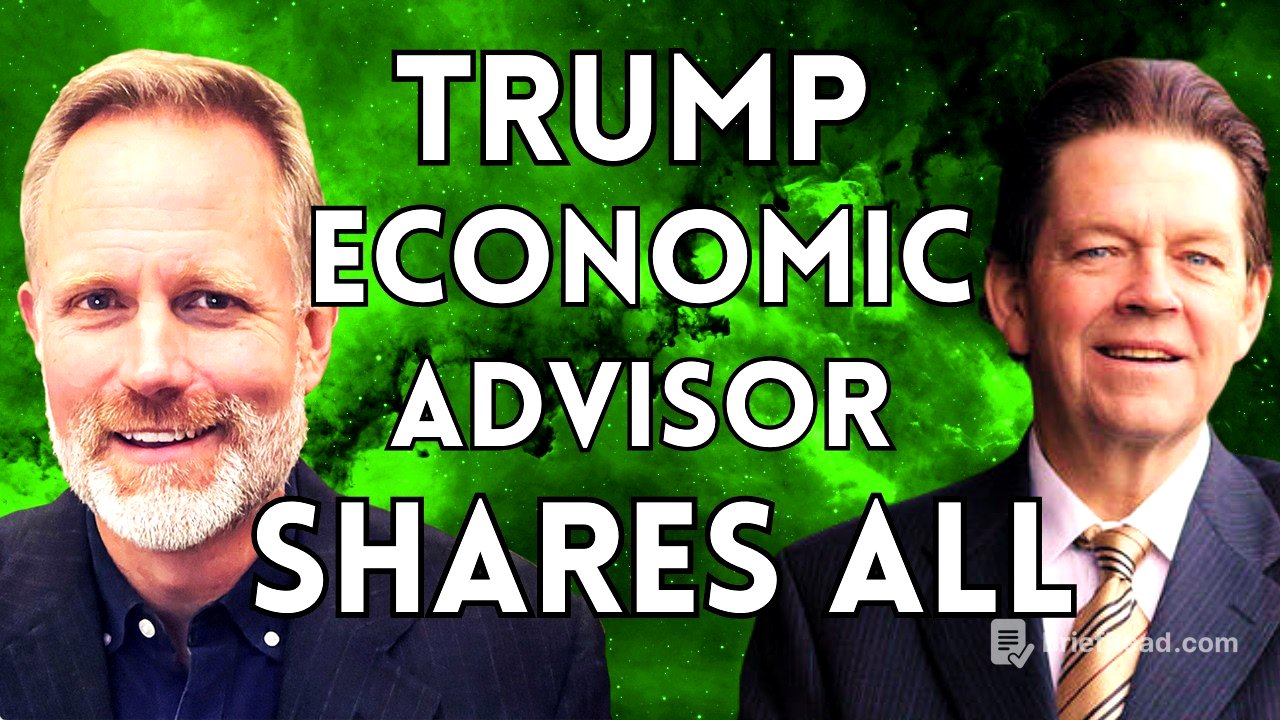TLDR;
This video features an interview with Dr. Arthur Laffer, a renowned economist and advisor to President-elect Trump. Laffer expresses extreme optimism about the upcoming Trump administration's economic plan, drawing parallels to the Reagan era. He believes the plan will lead to significant economic growth and prosperity, potentially even surpassing the Reagan era's transformation. Laffer outlines key aspects of the plan, including tax cuts, reduced government spending, deregulation, and a focus on free trade. He emphasizes the importance of a strong defense department and a peaceful foreign policy. Laffer also criticizes the current administration's economic policies and the Federal Reserve's monetary policy, advocating for a return to a more traditional approach.
- Laffer believes the Trump administration's economic plan will lead to significant economic growth and prosperity.
- He outlines key aspects of the plan, including tax cuts, reduced government spending, deregulation, and a focus on free trade.
- Laffer criticizes the current administration's economic policies and the Federal Reserve's monetary policy.
Trump's Economic Plan: A Reagan-Era Revival? [0:00]
Dr. Arthur Laffer, a prominent economist and advisor to President-elect Trump, expresses his strong belief that the incoming administration's economic plan will be highly successful, drawing parallels to the Reagan era. He highlights the plan's focus on tax cuts, reduced government spending, deregulation, and free trade, arguing that these policies will create a favorable environment for economic growth. Laffer emphasizes his optimism, stating that he feels as euphoric as he did when Reagan took office in the 1980s. He believes the plan will lead to a period of significant economic prosperity, potentially even surpassing the Reagan era's transformation.
Taxation: A Flat Tax Vision [5:41]
Laffer outlines the Trump administration's tax policy, emphasizing the goal of a low-rate, broad-based flat tax system. He criticizes the Biden administration's tax policies, arguing that they are anti-growth and detrimental to economic prosperity. Laffer highlights Trump's proposals for moving towards a flat tax, including the potential elimination of the income tax. He draws on historical examples, such as Jerry Brown's flat tax proposal in 1992 and the Reagan administration's 1986 Tax Act, to illustrate the potential benefits of a flat tax system.
Government Spending: A Focus on Efficiency [6:13]
Laffer emphasizes the Trump administration's commitment to reducing government spending, arguing that it is a key component of economic growth. He criticizes the Biden administration's spending policies, labeling them as wasteful and detrimental to the economy. Laffer believes that Trump will focus on streamlining government spending and reducing unnecessary expenditures. He highlights the importance of reducing the government's role in the economy, citing the "transfer theorem" which states that government spending ultimately comes at the expense of the private sector.
Monetary Policy: A Call for Change [7:04]
Laffer expresses concern about the Federal Reserve's current monetary policy, arguing that it is detrimental to economic stability. He criticizes Chair Jerome Powell's approach, contrasting it with the policies of former Fed Chair Paul Volcker. Laffer advocates for a more traditional approach to monetary policy, focusing on controlling the Fed's balance sheet and allowing interest rates to fluctuate naturally. He believes that this approach would help to control inflation and promote long-term economic growth.
Regulations: A Push for Minimalism [7:25]
Laffer strongly advocates for deregulation, arguing that it is essential for economic growth and prosperity. He criticizes the Biden administration's heavy-handed regulatory approach, citing the closure of the XL Pipeline as an example of misguided policy. Laffer believes that Trump will prioritize minimal regulations, creating a more favorable environment for businesses and economic activity.
Free Trade: A Tool for Negotiation [7:47]
Laffer emphasizes Trump's commitment to free trade, arguing that he uses trade as a negotiation tool to secure mutually beneficial agreements. He clarifies that Trump does not support high tariffs or quotas unless necessary to bring other countries to the negotiating table. Laffer highlights Trump's success in negotiating trade deals with Mexico, Japan, South Korea, Brazil, and Ecuador, demonstrating his commitment to reducing trade barriers and promoting free trade.
The Potential for Disruption [22:55]
Laffer acknowledges that the Trump administration's economic plan may cause some short-term disruption, but he believes that the long-term benefits will outweigh any temporary pain. He draws an analogy to quitting smoking, arguing that while there may be a withdrawal period, the long-term health benefits are significant. Laffer emphasizes that the plan's focus on reducing government spending and deregulation will ultimately lead to a more efficient and productive economy.
The Role of the Federal Reserve [19:37]
Laffer discusses the importance of the Federal Reserve in implementing the Trump administration's economic plan. He believes that the Fed's current leadership is not aligned with the administration's goals and advocates for a change in leadership. Laffer emphasizes the need for a Fed chair who understands the importance of controlling the monetary base and promoting economic growth. He believes that a more traditional approach to monetary policy is essential for long-term economic stability.
The Importance of Tax Policy [20:45]
Laffer highlights the importance of tax policy in driving economic growth. He believes that the Trump administration should prioritize tax reform early in its term, given the potential for political shifts in the midterm elections. Laffer emphasizes the need for a dedicated tax policy expert within the administration to ensure the successful implementation of the plan.
The Impact on the Markets [42:26]
Laffer expresses his belief that the Trump administration's economic plan will have a positive impact on the stock market, leading to a period of significant growth. He draws on historical examples, such as the market performance during the Reagan era and the "go-go 60s," to support his optimism. Laffer acknowledges that the market is currently at high valuations, but he believes that the economic growth generated by the Trump administration's policies will justify these valuations.
The Battle of Economic Ideologies [38:55]
Laffer discusses the fundamental differences between Keynesian economics and supply-side economics. He argues that the Trump administration's economic plan is based on supply-side principles, which emphasize economic growth, deregulation, and reduced government intervention. Laffer criticizes Keynesian economics, arguing that it focuses on redistribution and government intervention, which he believes are detrimental to economic prosperity. He emphasizes the importance of creating a larger economic pie rather than simply redistributing a shrinking one.
The Future of Money [50:35]
Laffer discusses the rise of Bitcoin and gold as a sign of dissatisfaction with government-controlled fiat currencies. He argues that the government's monopoly on money has led to inflation and economic instability. Laffer advocates for a return to a private banking system or, if not possible, for the government to create a sound money system. He expresses his belief that the private market is attempting to address the problems of government-controlled money through the adoption of alternative currencies like Bitcoin.







![Python for Beginners – Full Course [Programming Tutorial]](https://wm-img.halpindev.com/p-briefread_c-10_b-10/urlb/aHR0cDovL2ltZy55b3V0dWJlLmNvbS92aS9lV1JmaFpVenJBYy9ocWRlZmF1bHQuanBn.jpg)

